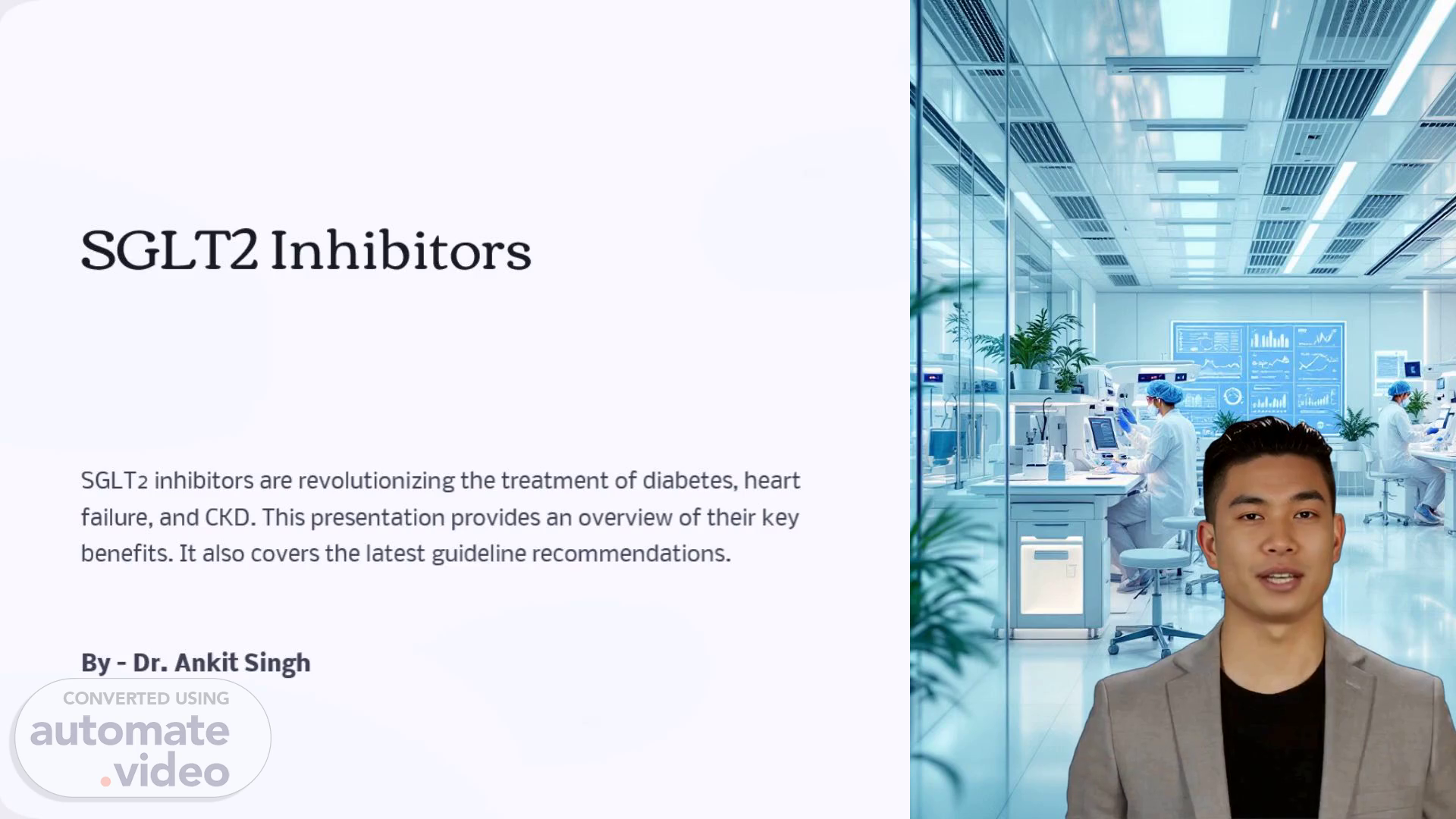Scene 1 (0s)
[Virtual Presenter] SGLT2 inhibitors are revolutionizing the treatment of diabetes, heart failure, and chronic kidney disease. This presentation provides an overview of their key benefits, which it also covers along with the latest guideline recommendations..
Scene 2 (16s)
[Audio] SGLT2 inhibitors have been shown to significantly reduce cardiovascular mortality and morbidity. Studies such as EMPA-REG OUTCOME, CANVAS, and DECLARE-TIMI 58 have demonstrated impressive results. Empagliflozin reduced cardiovascular death by 38%, while Canagliflozin showed a 14% reduction in major cardiovascular events. Additionally, dapagliflozin reduced hospitalization for heart failure. A meta-analysis has also found that SGLT2 inhibitors reduce the risk of heart failure hospitalization by 30%. These findings highlight the importance of SGLT2 inhibitors in preventing cardiovascular complications..
Scene 3 (1m 2s)
[Audio] SGLT2 inhibitors have provided significant renal protection in various clinical trials. The CREDENCE trial showed that canagliflozin reduced the risk of kidney failure by 30% in patients with diabetic kidney disease. Additionally, the EMPA-KIDNEY trial found that empagliflozin slowed the progression of chronic kidney disease by 28%, demonstrating its potential to positively impact kidney health..
Scene 4 (1m 29s)
[Audio] SGLT2 inhibitors have been shown to reduce hospitalizations and mortality rates in patients with heart failure. The DAPA-HF trial demonstrated that dapagliflozin significantly reduced hospitalizations due to heart failure and cardiovascular death. Additionally, the EMPEROR-Reduced and EMPEROR-Preserved trials found that empagliflozin improved outcomes in patients with heart failure with reduced ejection fraction and those with preserved ejection fraction respectively. These findings highlight the potential benefits of SGLT2 inhibitors in managing heart failure..
Scene 5 (2m 8s)
[Audio] SGLT2 inhibitors have been shown to be beneficial in the treatment of chronic kidney disease, or CKD. This is supported by the KDIGO 2022 guidelines, which recommend their use for patients with both CKD and type 2 diabetes mellitus. One of the key benefits of SGLT2 inhibitors in this setting is that they can slow the decline of estimated glomerular filtration rate, or eGFR, regardless of the patient's starting level of eGFR. This is significant because it means that even patients with more advanced kidney disease may still benefit from treatment with SGLT2 inhibitors. Additionally, these medications have been shown to reduce albuminuria, or excess protein in the urine, and lower the risk of cardiovascular events in patients with CKD..
Scene 6 (3m 3s)
[Audio] SGLT2 inhibitors have reduced A1c levels by typically 0.7-1.0%. This reduction in A1c levels is an important benefit for patients with type 2 diabetes. Moreover, patients who take SGLT2 inhibitors tend to lose an average of 2-3 kilograms, which can lead to improvements in overall health. Additionally, systolic blood pressure is reduced by 3-5 millimeters of mercury, providing additional cardiovascular benefits..
Scene 7 (3m 36s)
[Audio] SGLT2 inhibitors have a place in therapy as both first-line and add-on treatments. They can be used as a first-line therapy when combined with ASCVD, heart failure, or chronic kidney disease for patients with type 2 diabetes. Furthermore, they can be added to metformin for patients who are not yet at their target A1c level, enabling them to achieve better glucose control..
Scene 8 (4m 0s)
[Audio] Genital mycotic infections and urinary tract infections are possible side effects of SGLT2 inhibitors. Although rare, diabetic ketoacidosis and Fournier's gangrene are serious complications that require awareness. Furthermore, it is essential to monitor for volume depletion, especially in elderly patients, and stress the significance of proper hydration practices..
Scene 9 (4m 27s)
[Audio] The dosing regimens for SGLT2 inhibitors differ depending on the specific medication. Empagliflozin can be taken in doses of 10 mg or 25 mg once daily, whereas dapagliflozin comes in doses of 5 mg or 10 mg once daily. Canagliflozin, conversely, has doses of 100 mg or 300 mg once daily. It is vital to adjust the dosage according to the patient's renal function, and regular monitoring is necessary..
Scene 10 (4m 58s)
[Audio] SGLT2 inhibitors have been shown to provide robust evidence supporting cardiovascular and renal benefits. These treatments have been proven to improve patient outcomes and quality of life. With this knowledge, we can conclude that SGLT2 inhibitors truly represent a paradigm shift in the way we treat these conditions..
